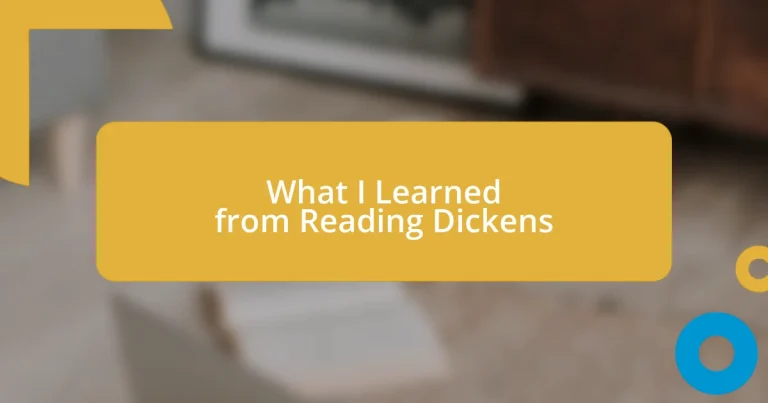Key takeaways:
- Characters like Pip, Scrooge, and Oliver Twist exemplify resilience, redemption, and the strength of vulnerability, highlighting personal growth through adversity.
- Dickens emphasizes social justice themes, critiquing systemic issues such as child labor and economic inequality, compelling readers to reflect and take action.
- The influence of Dickens on modern literature is evident in character depth, social commentary, and storytelling techniques that emphasize empathy and complex narratives.
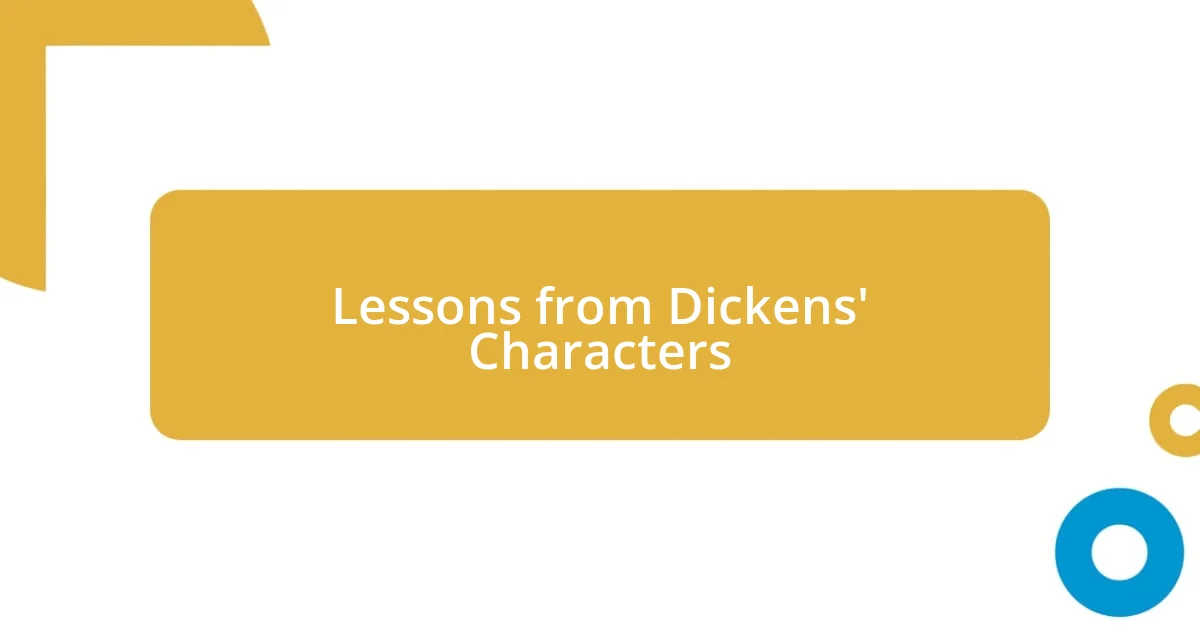
Lessons from Dickens’ Characters
When I think of Dickens’ characters, one lesson stands out: resilience in the face of adversity. Take Pip from Great Expectations, who endures profound disappointment yet rises above his circumstances. Isn’t it uplifting to realize that no matter our struggles, there’s always the possibility of growth and transformation?
Then there’s Scrooge from A Christmas Carol, illustrating the power of redemption. His journey reminds me of a friend who transformed his life after hitting rock bottom. I often wonder, how many of us have the capacity for change lurking within, waiting for the right moment to emerge?
Lastly, consider Oliver Twist, who teaches us about the strength found in vulnerability and innocence. When I reflect on Oliver’s plight, I recall instances in my life when simply being open and hopeful led me to unexpected support. Isn’t it interesting how showing our true selves can often invite empathy and kindness from others?
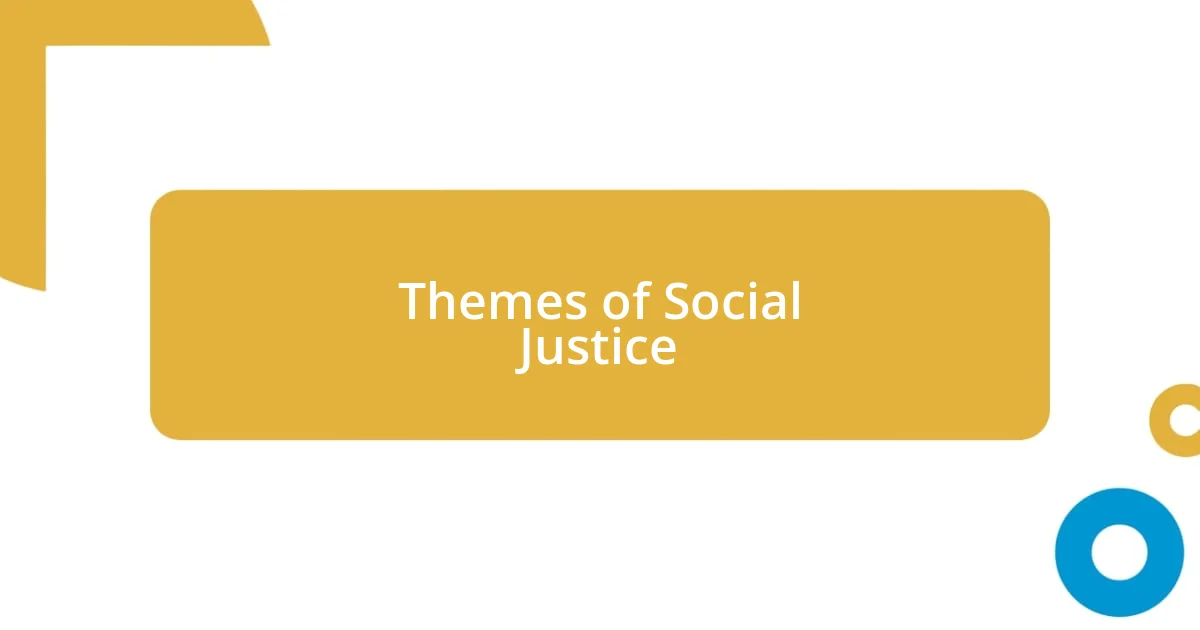
Themes of Social Justice
It’s fascinating how Dickens weaves themes of social justice throughout his works. His stories often highlight the stark contrasts between the wealthy and the impoverished, compelling readers to confront the uncomfortable realities of their society. I recall feeling a pang of empathy as I read about the plight of the working class in Hard Times. It left me questioning what more I could do to advocate for those suffering injustice in my own community.
Moreover, Dickens doesn’t shy away from critiquing systemic issues like child labor and the treatment of the poor. In Oliver Twist, the portrayal of workhouses painted a vivid, heartbreaking picture that struck a nerve with me. This depiction was a turning point, igniting my desire to volunteer at a local shelter. It made me realize that literature can indeed inspire action, prompting us to be more empathetic and engaged with social issues.
Additionally, I find the development of characters like David Copperfield significant in terms of social inequality. As he navigates through the struggles imposed by an indifferent society, it’s almost like witnessing a microcosm of the broader social injustices prevalent in Dickens’ London. Reflecting on his experiences serves as a powerful reminder that while we might feel insignificant alone, our voices collectively can challenge the status quo and champion change.
| Work | Themes of Social Justice |
|---|---|
| Hard Times | Critique of industrialization and its effects on the working class |
| Oliver Twist | Exposé of child labor and the cruel conditions of workhouses |
| David Copperfield | Exploration of social inequality and personal struggle against societal norms |
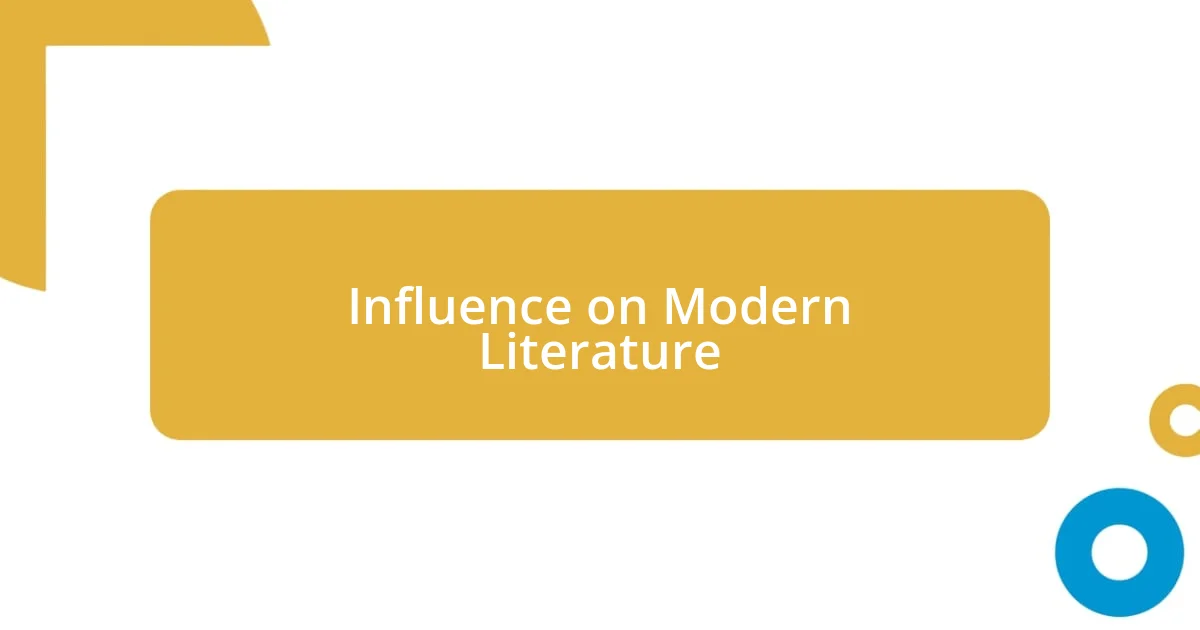
Influence on Modern Literature
Dickens’ influence on modern literature is truly profound. His ability to create complex characters and vivid settings set a standard that many contemporary writers aspire to replicate. I remember reading a novel recently that echoed Dickens’ flair for capturing social issues. It struck me how modern authors often incorporate his themes of class struggle and redemption, showing that his impact is still alive and well in today’s fiction.
Here are a few ways I see Dickens shaping modern literature:
- Character Depth: Writers today often draw from Dickens’ multi-dimensional characters, giving their own protagonists rich backstories and moral dilemmas.
- Social Commentary: Just like Dickens, contemporary novels frequently tackle social issues, encouraging readers to reflect on pressing societal problems.
- Serialization: The practice of publishing stories in installments, popularized by Dickens, continues to influence how stories are told and consumed, particularly in the age of digital media.
- Empathy and Connection: I’ve noticed that many modern works echo the emotional resonance of Dickens’ storytelling, focusing on vulnerable characters that invite reader empathy.
- Complex Plotting: Dickens’ intricate plots, filled with twists and turns, inspire current authors to weave complicated narratives that keep readers engaged and guessing.
Reflecting on these influences, I feel a sense of connection between Dickens’ era and our own. It’s as if reading his works creates a bridge that connects the struggles of the past with those of today’s society, reminding us of the timeless human experience.
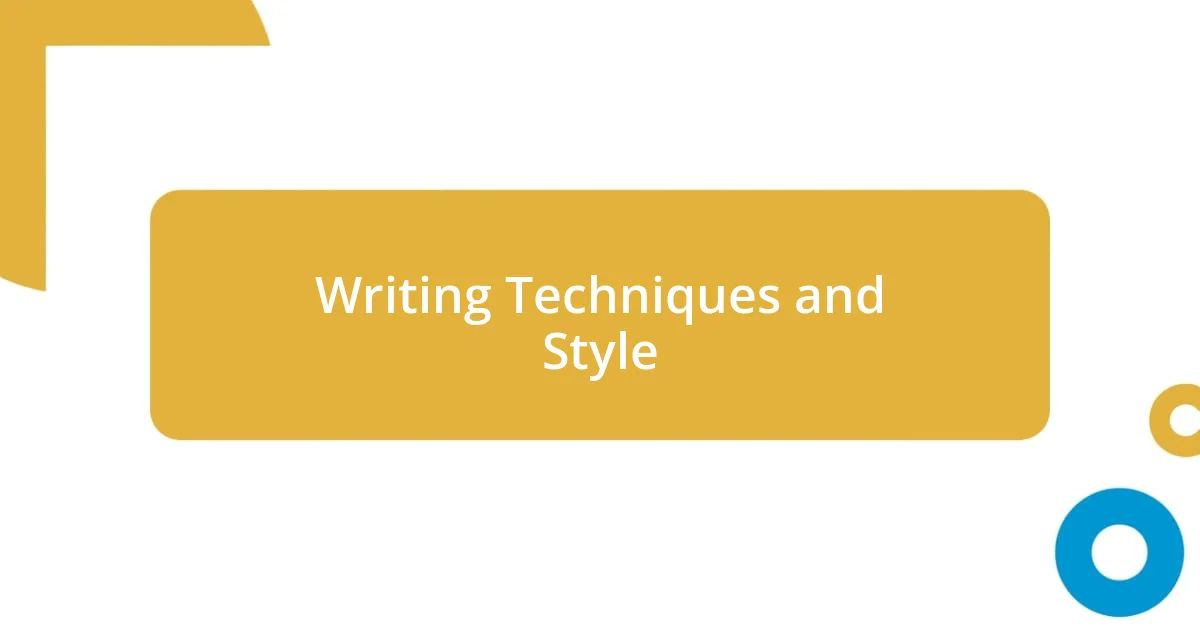
Writing Techniques and Style
Dickens’ writing style is notable for its vivid detail and rich characterizations, which I find incredibly engaging. He paints his characters with such nuance that it’s almost as if I’m having a conversation with them. For example, when I first encountered Ebenezer Scrooge in A Christmas Carol, I could feel his cold demeanor wrapping around me like a chill. It made me wonder—how often do we judge others based solely on their appearances or first impressions?
Furthermore, Dickens had a knack for employing humor and satire even in the most serious contexts, a duality that keeps readers on their toes. This approach reminds me of conversations with friends where laughter intertwines with serious discussions about life. Take The Pickwick Papers, for instance; the hilarity laced throughout the story starkly contrasts with the social commentary woven within. It’s this balance that makes Dickens’ prose not only enjoyable but also thought-provoking.
Finally, I admire Dickens’ use of suspense and cliffhangers. His chapters often end with a twist that leaves readers yearning for more. I recall finishing a chapter of Great Expectations one evening, an insatiable curiosity gripping me about Pip’s fate. It’s moments like these that highlight how Dickens masterfully keeps the reader engaged, compelling us to turn the page and continue the journey. Who doesn’t love being swept away in a story that feels like a puzzle, where every piece adds depth to the narrative?
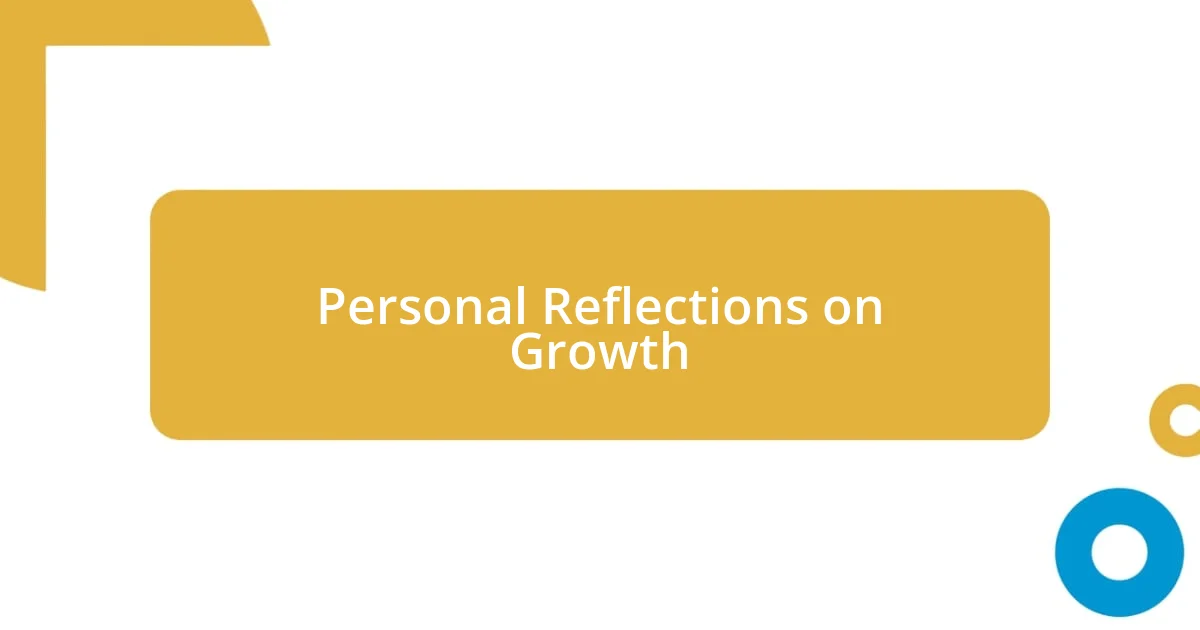
Personal Reflections on Growth
Dickens’ works have taught me that growth often comes from facing adversity. I remember struggling with my own challenges, feeling like the weight of the world was on my shoulders. Just like David Copperfield did, I realized that those experiences, while painful at the time, foster resilience and shape our character. Have you ever looked back at a tough period in your life and found that it paved the way for something better?
Reading Dickens has also reinforced the importance of empathy in personal growth. I vividly recall the first time I read about Little Nell in The Old Curiosity Shop. Her story stirred a deep sense of compassion within me, prompting me to reflect on the trials faced by those less fortunate. It makes me wonder—how often do I pause to consider the struggles of others in my daily life? In embracing empathy, I’ve noticed my own perspectives broaden, allowing for genuine connections with people around me.
Moreover, Dickens’ ability to transform his characters through hardship resonates with my own experiences. I often find myself reflecting on characters like Pip from Great Expectations, who evolves through his trials and tribulations. As I navigate my personal journey, I ask myself whether I’m allowing my experiences to shape me into a better version of myself. I believe that, much like Dickens’ characters, the way we respond to our challenges ultimately defines our growth and our path forward.
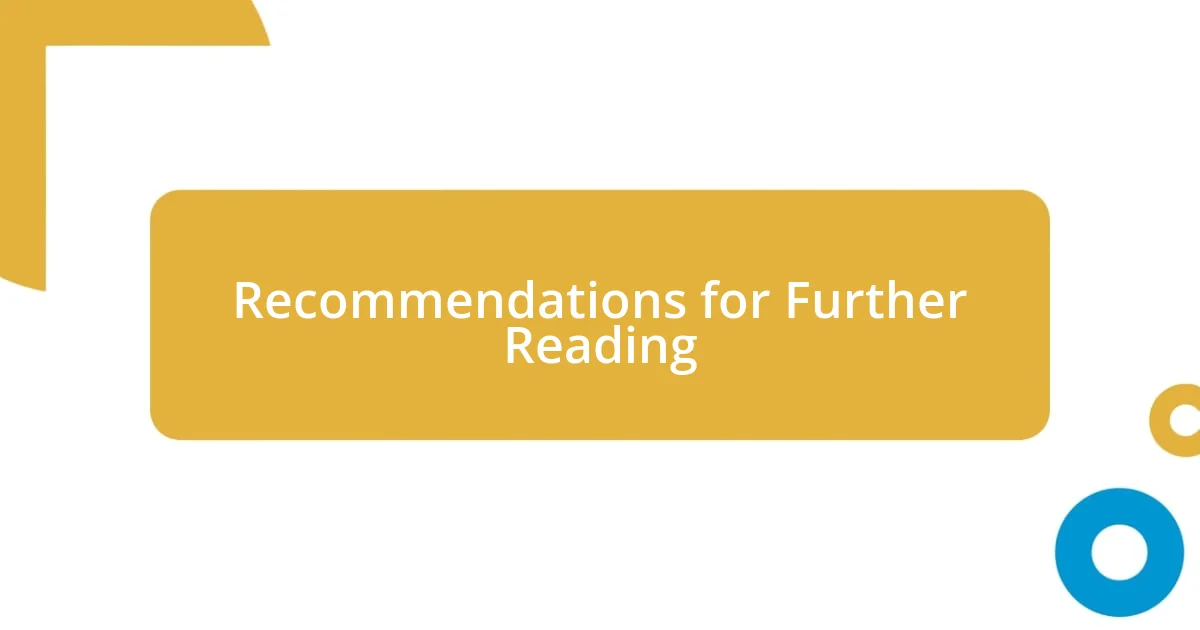
Recommendations for Further Reading
To delve deeper into the world of Charles Dickens, I highly recommend picking up Oliver Twist. This particular novel opened my eyes to the harsh realities of poverty and child exploitation during Dickens’ time. I still vividly remember the first time Oliver uttered his famous line, “Please, sir, I want some more.” It struck a chord with me, highlighting not just the desperation of the character but also the broader societal issues Dickens aimed to address. Have you ever encountered a character whose plight made you rethink societal norms?
For those who appreciate a touch of humor sashayed alongside social critique, Hard Times is a gem you shouldn’t overlook. Its exploration of industrial society’s impact on education and human relationships left me contemplating the cost of progress. I found myself laughing and cringing simultaneously as I navigated the absurdities of Gradgrind’s philosophy. This duality encouraged me to reflect on how our own views can sometimes become rigid in an ever-changing world. Isn’t it fascinating how humor can often reveal deeper truths?
Lastly, if you’re looking for something that combines both charm and a bittersweet narrative, give Little Dorrit a shot. The intricate portrayal of life within the Marshalsea Prison spoke to me on so many levels. I couldn’t help but think about how the environment shapes our identities and experiences. As I journeyed through Dorrit’s tale, I found myself questioning how many of us remain trapped by our own societal constructs. Isn’t it compelling to contemplate what freedom truly means in the context of our lives?
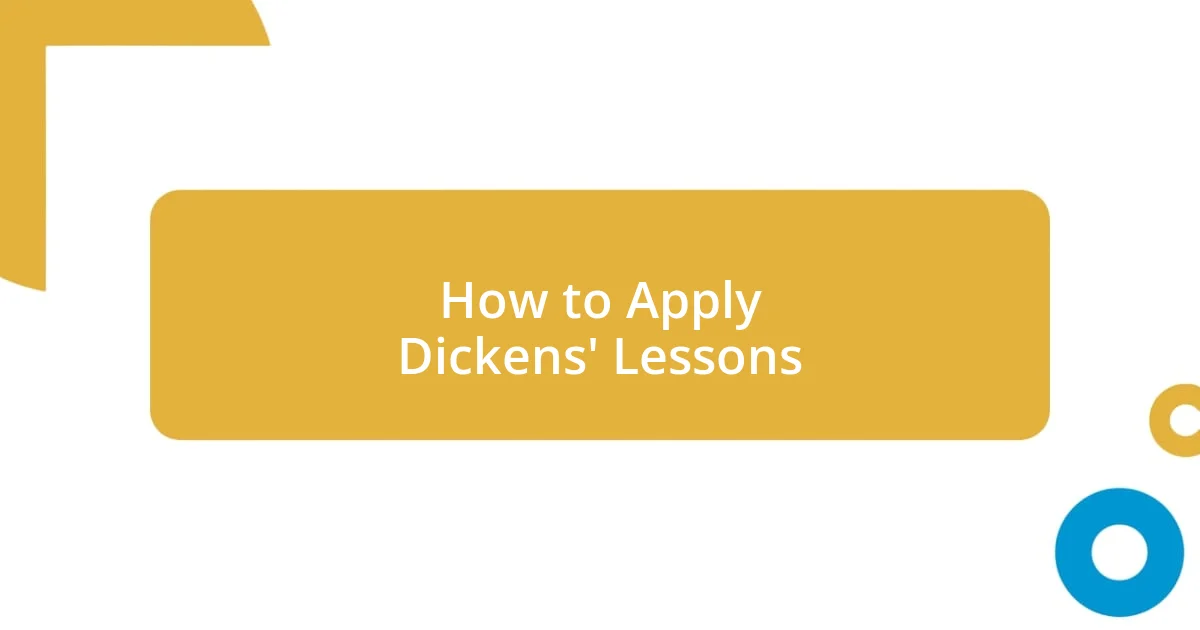
How to Apply Dickens’ Lessons
Applying the lessons from Dickens can be incredibly transformative in our own lives. For instance, I’ve often found myself reflecting on how the sense of community portrayed in A Christmas Carol can enrich our relationships. In a world that sometimes feels disconnected, I’ve made a conscious effort to nurture my connections, whether by lending a listening ear or simply reaching out to friends. Isn’t it amazing how a small act of kindness can ripple out and create a stronger community?
Empathy is another vital lesson from Dickens that I’ve tried to weave into my daily interactions. When I think back to my days volunteering at a local shelter, I recall the stories shared by those I met; they reminded me of characters like Tiny Tim—full of hope despite their circumstances. Each conversation offered a unique perspective, encouraging me to better appreciate the struggles of others. Don’t you think it’s important to step outside our own bubble every now and then?
Additionally, I’ve realized the power of storytelling in advocating for change, a skill I picked up from Dickens. When I wrote a piece about social injustice inspired by Bleak House, I noticed how sharing personal experiences can spark important conversations. It felt empowering to use my voice, much like Dickens did to illuminate societal issues, and I still cherish the feedback from readers who connected with my message. Have you ever considered how your own stories might influence others?












